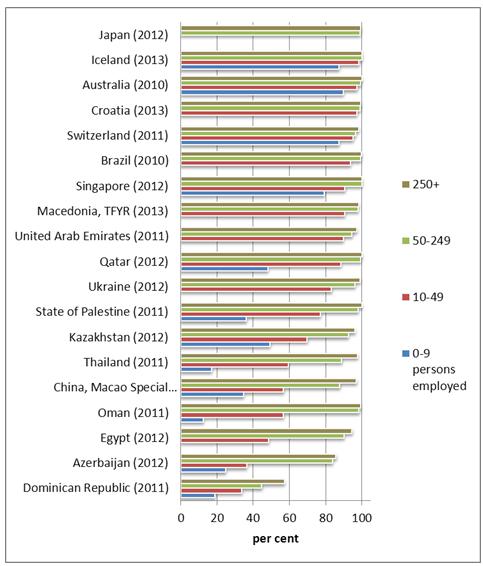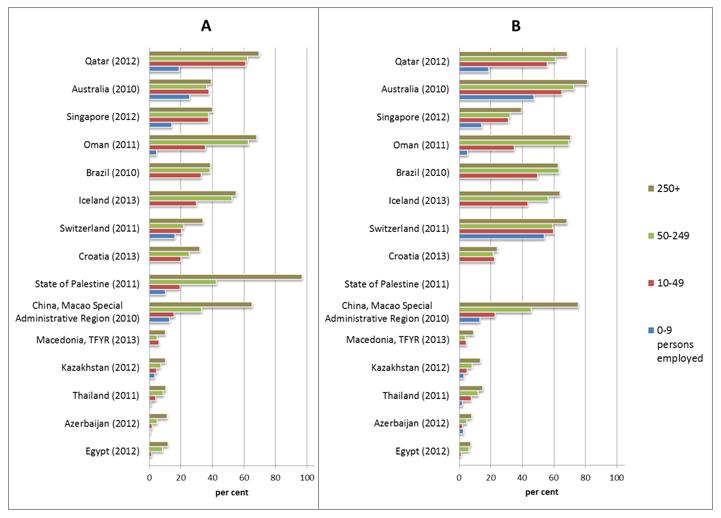Smaller businesses, especially those in developing and transition economies, are losing out on the benefits of the information economy, UNCTAD 's annual update of its dataset on the enterprise use of information and communication technology (ICT) shows.
The new data suggest that the smallest companies in particular are less likely to be connected to the Internet (figure 1). While the difference is slight in a highly developed economy such as Switzerland, where 90-98 per cent of all companies use the Internet, the relationship between size of enterprise and Internet use is more pronounced in developing countries. For example, in Oman, while about 98 per cent of companies employing 50 people or more in 2011 were using the Internet, only around 10 per cent of companies with nine employees or less used the Internet.
Because micro, small and medium-sized businesses are significant incubators of innovation, growth and competitiveness, their relative lag in ICT connectivity has important policy implications.
UNCTAD also tracks businesses that have a web site, businesses with access to the Internet by type and speed of the connection, business use of the Internet and e-commerce.
Although the volume and value of global e-commerce transactions continue to expand, UNCTAD data show that, in most markets, businesses are generally more likely to buy products than sell them online (figure 2).
Meanwhile, in many developing and transition economies, most businesses – and micro and small enterprises in particular – are significantly less involved in e-commerce than those in developed countries.
Even in relatively developed economies, the proportion of businesses selling their products online is well below 50 per cent.
In other countries such as Azerbaijan, Egypt, Kazakhstan and Thailand, the proportion of businesses selling online was as low as below 20 per cent, according to the latest available data, reflecting the potential gains still to be achieved in this area.
Businesses are generally among the first adopters of ICTs such as the Internet, computers and mobile phone technology because it helps boost their competitiveness in local and international markets and can be significant plus to the efficiency and vibrancy of the business sector, which is a key engine of economic growth.
However, businesses are unequally equipped to take advantage of the opportunities presented by the information economy. When looking beyond aggregate figures, small enterprises are much less frequent users of ICTs for internal administration, e-commerce and interacting with governments. Some economic sectors also lag behind.
Measuring the information society must be an integral component of national ICT plans and policies and research on ICT trends and impact on development would benefit significantly from improved data quality and availability. This requires close cooperation between policymakers and statistical offices and among stakeholders in the national statistical system. Currently only six African countries report such statistics – without which others have to develop related policies without knowing the facts.
The 2015 issue of the UNCTAD Information Economy Report will be dedicated to an analysis of e-commerce and its impact on developing economies.
Figure 1: Proportion of businesses using the Internet, selected economies, latest available year

Source: UNCTADStat.
Figure 2: Proportion of businesses receiving (A) and placing (B) orders over the Internet, selected economies, latest available year

Source: UNCTADStat.
Box 1: Online UNCTAD data on the information economy
In the context of the Partnership on Measuring ICT for Development, UNCTAD's Division on Technology and Logistics publishes data for the core indicators related to the information economy. Twelve of these concern business use of ICT:
• B1: Proportion of businesses using computers
• B2: Proportion of persons employed routinely using computers
• B3: Proportion of businesses using the Internet
• B4: Proportion of persons employed routinely using the Internet
• B5: Proportion of businesses with a web presence
• B6: Proportion of businesses with an Intranet
• B7: Proportion of businesses receiving orders over the Internet
• B8: Proportion of businesses placing orders over the Internet
• B9: Proportion of businesses using the Internet by type of access
• B10: Proportion of businesses with a local area network
• B11: Proportion of businesses with an extranet
• B12: Proportion of businesses using the Internet by type of activity
The core indicators were developed by the Partnership on Measuring ICT for Development after a consultation process involving NSOs worldwide and were endorsed by the United Nations Statistical Commission (UNSC) at its 40th session in 2009. Data corresponding to 79 economies for selected indicators are available disaggregated by enterprise size class, by location and by economic activity. Data were provided by Eurostat for its member states.
Through its initiative on measuring the information economy, UNCTAD helps developing countries to monitor and benchmark their participation in the information economy, and encourages nationally-representative and transparent data collection and dissemination on ICT. To achieve these goals, UNCTAD has developed a Manual on the Production of Information Economy Statistics and regularly organizes training workshops and advisory missions to help national statisticians from developing and transition economies improve the measurement of enterprise use of ICT.



